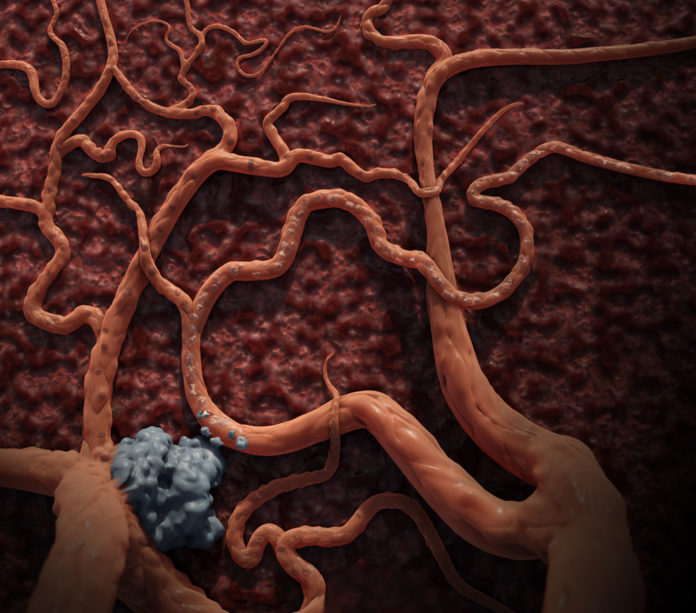
A new study in mouse models of cancer has offered up new insights into why immune checkpoint inhibitor immunotherapies (CPIs) such as PD-1 blockade, may be ineffective for patients who have tumors that have metastasized to the liver. Researchers headed by a team at the University of California, San Francisco (UCSF) carried out experiments in a dual tumor mouse model, which pinpointed regulatory pathways that are inhibited when liver metastases have developed. The results showed that the presence of tumor antigen in the liver not only compromised immunity within the liver itself, but also modified the functions of tumor-killing T cells at distant tumor sites. This suppression of antitumor immunity depended on the activity of T regulatory cells (Tregs) and was linked to remodeling of tumor-infiltrating monocytes. The resulting dysfunction in antitumor immunity could be reversed by combining PD-1 checkpoint blockade with depletion of immunosuppressive regulatory T cells (Tregs).
The researchers suggest their results support the notion that a combination of immune checkpoint blockade and Treg targeting could boost therapeutic efficacy against persistent tumors. The findings also indicate that cancer invasion of certain organs may have a substantial impact on the success of checkpoint inhibition immunotherapies.
In their published paper in Science Immunology, the investigators, led by UCSF Hematology and Oncology Clinical Fellow James Lee, MD, MHS, concluded, “… our findings complement the mounting clinical studies showing a reduced response to CPIs in patients with cancer with liver metastases and implicate additional regulatory pathways that are engaged in the presence of liver metastases.” He further noted, “The liver actually triggers differences in immune cells at distant sites. The liver can choose its enemy – what it wants to protect or not protect.” The authors report on their findings in a paper titled, “Regulatory T cell control of systemic immunity and immunotherapy response in liver metastasis.”
Cancer immunotherapy has become a promising standard-of-care treatment – and in some cases, may even be curative – for a wide variety of different cancers, but it doesn’t work for every cancer patient, and researchers have increasingly turned their attention to understanding why. Also, patients who initially may respond well to the checkpoint inhibitors, such as those that target PD-1, can develop resistance to these therapies if their cancer has metastasized from its initial location to form additional tumors in the liver, even if their primary cancer was quite distant from the liver.
“… for melanoma, lung, kidney, and several other malignancies where CPIs have shown efficacy, accumulating evidence suggests that the presence of liver metastasis reduces response rate and progression-free and overall survival,” the investigators wrote. And for patients who have disease progression following CPI therapy, there are “limited salvage options,” they continued. “Because the liver is one of the most common sites of metastases of all malignancies, this problem poses a significant unmet challenge in the field of immuno-oncology.” However, despite accumulating clinical evidence, it’s not clear how liver metastasis impacts on systemic antitumor immunity, and the mechanism that underpins CPI resistance in patients isn’t well understood.
Some cancers are able to avoid detection within the body by cloaking themselves from the immune system. They can produce proteins, such as PD-L1, which switch off regulatory T cells, and this, in turn inhibits the immune response of other T cells that attack cancer. Some checkpoint inhibitors are designed to counteract this cloaking process by preventing PD-L1 from binding to the PD-1 receptors – off-switches – on T cells, which then allows a normal defensive immune response against cancer cells.
The liver filters large quantities of blood directly from the digestive system and the rest of the body, and plays a key role in regulating the immune system, specifically, by signaling which of the scavenged proteins it encounters are from hostile invaders, and which should be ignored.
In their newly reported work, supported by the Parker Institute for Cancer Immunotherapy, Lee, together with senior author Jeffrey Bluestone, PhD, adjunct professor of microbiology and immunology and the A.W. and Mary Margaret Clausen Distinguished Professor of Metabolism and Endocrinology, and colleagues, simulated metastasis by implanting mice with cancer cells in two separate locations, first under the skin and then in either the liver or the lung. They found evidence that when cancer takes hold in the liver it is “uniquely suppressive,” said Lee, and able to harness the liver’s capacity to retrain the immune system and exert its influence on the immune response to related cancers that are distant in the body.
Their studies showed that compared to survival rates among anti-PD-1-treated mice with secondary cancers implanted in the lung, the survival rates among mice with secondary liver cancers were significantly worse after anti-PD-1 therapy. The immune system effectively did not learn to recognize the liver tumor or, notably, the related tumor implanted under the skin. “Using a dual-tumor immunocompetent mouse model, we found that the immune response to tumor antigen presence within the liver led to the systemic suppression of antitumor immunity,” they wrote. “The liver tumors not only compromise intrahepatic immunity but also affect distant antitumor immunity and may contribute to the reduced efficacy of systemic anti–PD-1 treatment seen in the clinical setting.”

Finally, the researchers also showed that liver tumors change which genes are expressed in Tregs and, through those cells, a host of other immune-system cells as well. “It turned out that there wasn’t a difference in the quantity of Tregs between the skin tumors of mice with liver cancers and the mice without liver cancers. It was a difference in quality,” Lee said. “… the tumor-specific CD8+ T cells in the SQ [subcutaneous] sites differed qualitatively between the two experimental groups, with cells from the liver tumor group having reduced expression of activation markers and effector cytokines,” the scientists stated.
Since liver tumors caused Tregs to suppress the T cell response against tumors, the researchers tested two drugs to see if they could override the effect of the Tregs. The first was a drug that blocks the T cell checkpoint inhibitor CTLA-4, which unleashes these cells to attack cancer. In the 1990s, Bluestone did pioneering research on CTLA-4 that helped lay the foundations for cancer immunotherapy. The second drug, another anti-CTLA-4 compound, targets Tregs directly and depletes their numbers. The team’s experiments showed that while both drugs restored the effectiveness of anti-PD-1 therapy, the anti-CTLA-4 drug that depletes Tregs was more effective.
The researchers hope to apply this combination therapy in the future to patients whom they know ahead of time are less likely to respond to treatment. “Our data support the rationale to more precisely deploy Treg-targeting combination immunotherapy in scenarios where Treg activity may be biologically enhanced,” the authors concluded. “We’ve never had this kind of precision in immunotherapy in the past,” Lee said. “What if, right from the start, you could use a drug that depletes Tregs as a complement to immunotherapy in patients with liver metastasis?”





